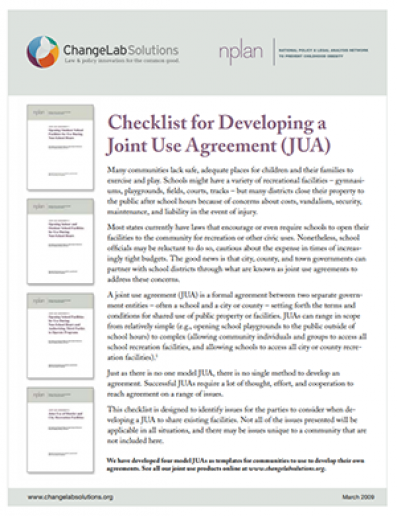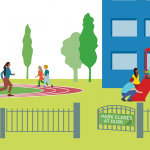Developing a Joint Use Agreement
Issues to consider
Many communities lack safe, adequate places for children and their families to exercise and play.
Schools might have a variety of recreational facilities—gymnasiums, playgrounds, fields, courts, tracks—but many districts close their property to the public after school hours because of concerns about costs, vandalism, security, maintenance, and liability in the event of injury.
Most states currently have laws that encourage or even require schools to open their facilities to the community for recreation or other civic uses. Nonetheless, school officials may be reluctant to do so, cautious about the expense in times of increasingly tight budgets. The good news is that city, county, and town governments can partner with school districts through what are known as joint use agreements to address these concerns.
A joint use agreement (JUA, also sometimes called a shared use agreement) is a formal agreement between two separate government entities—often a school and a city or county—setting forth the terms and conditions for shared use of public property or facilities. JUAs can range in scope from relatively simple (e.g., opening school playgrounds to the public outside of school hours) to complex (allowing community individuals and groups to access all school recreation facilities, and allowing schools to access all city or county recreation facilities).
Just as there is no one model JUA, there is no single method to develop an agreement. Successful JUAs require a lot of thought, effort, and cooperation to reach agreement on a range of issues.
This checklist is designed to identify issues for the parties to consider when developing a JUA to share existing facilities. Not all of the issues presented will be applicable in all situations, and there may be issues unique to a community that are not included here.
People who volunteer in support of school facility use sometimes worry that they could be at risk of liability if an injury occurs while they are volunteering. For more information about the significant legal protections for volunteers provided by the federal Volunteer Protection Act, see our fact sheet on Volunteers and Liability.


